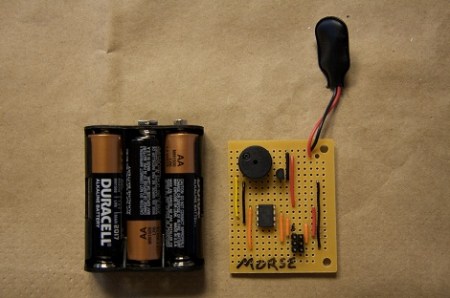
[Eric] wanted to teach his kids Morse code, so he built a tiny Morse code trainer.
[Eric] built the trainer around an ATtiny85, and the rest of the circuit follows this minimalist idea. After connecting a piezo beeper and 6-pin ISP header, the only thing left to do was write a little code and start teaching his kids Morse. The Morse trainer is programmed to repeat the message, “SOS the moon rover has broken down and I am stuck in the trash can in the garden shed,” [Eric] planted a Lego moon rover in his shed as a prize for learning Morse, making him one of the coolest dads ever.
Although learning Morse isn’t required for an amateur radio license anymore, it’s a requirement for continuous wave radio. We think this is a great way to learn Morse the right way – actually hearing the characters – instead of memorizing the Huffman tree of Morse characters.















I love it! Morse is actually far easier to learn than you’d imagine. If anyone actually does want to learn Morse code, grab a character chart and check out Morse.exe on http://c2.com/ward/morse/morse.html
Slightly off topic, but i’ve never seen an AA battery holder with 9v battery terminals on top, I love it. Anyone know where I can get one? I did some quick searching and i couldn’t find it.
@tempmj: A lot of AA battery holders use PP9 contacts. I get mine from Farnell.
I remember my Dad teaching me Morse code as a kid. He did it the old fashioned way, he sat down and tapped out messages to me.
its a bit risky though, someone might connect a 9v battery to the circuit and damage it.
p.s. nice project, ace dad and morse is fantastic. Didn’t it save the world in “independance day” or was it mars attacks? I forget. My dad taught me, got my 5wpm but never got to 12. Its so much easier to send fast than read fast
Morse Code is one of the most effective ways for two humans to exchange information over a noisy channel. This makes it ideal for use with simple, home-built low power “QRP” radios like this: http://www.indianapolis.net/QRPp-I/pixie2.html
You can, of course, get a lot more sophisticated and use error-correcting codes and such, but Morse was used professionally for over 100 years, because you need nothing more than your ears and a radio to receive it in the presence of pretty sever noise.
finally a cool classic hack. I like this one a lot. If i had my way, we’d be using morse code to convey info on the itnernet
Learning Morse code by light is pretty cool as well, and can be transmitted long distances.
TAhe garbage can is a pretty terrible place to hide something. I put a snowblower part on TOP of my garbage can once, and my son dutifully chucked it into the can when it took it out to the road for pickup. By the time I got home, it was long gone and I had to fab a new part from scratch to revive the snowblower.
Travels By; smoke, sound, light, also in time by writing it down as your signature, etc etc.
The Geek in me has always wanted to learn Morse code, but the Bachelor in me says learning Sign Language, or Music notes, another language, etc. will get much more cHiCkS.!
I’ve got Rosetta Stone Spanish, now I’m off to the Internet in search of a good PC program to learn American Sign. Last I checked there wasn’t anything but websites with info.
“Although learning Morse isn’t required for an amateur radio license anymore, it’s a requirement for continuous wave radio.”
So knowing Morse code is a prerequisite for using Morse code?
Just use a sonalert, battery and key. Or swap the sonalert for an LED and resistor if the noise is keeping the grandkids awake.
SunGod: There’s lots of ASL material available online at such places as Youtube, for once you get some basic understanding.
…but couldn’t you beat that challenge by just scribbling down the signs you hear, then decode it with a chart? I mean that’s not exactly having learned Morse code…
Anyway – cue in DIY one-key PC keyboard (it uses Morse code and it’s done with an Arduino, of course) in 3…2…1…
@sun dog: There aren’t any good ASL or signed English software according to my wife (teacher of the deaf). Find a college and audit a class or (for better results) a deaf person to tutor you or (for best results) a deaf community to work with. Just keep in mind that signed language has several dialects. What means “cabbage” in one area means “trash” in another.
This is a good thing for teaching kids Morse code. Just have to keep up with it lest you forget it. I haven’t used Morse in 15 years and only remember SOS. If you have deaf or hard-of-hearing friends, I think this might be easily adaptable to use LEDs.
There’s a lovely morse keyer – kind of the opposite of this – using a full Arduino. I use it all the time for long-distance radio work: https://radioartisan.wordpress.com/arduino-cw-keyer/
Morse can be very easily copied in software – Fldigi is a good free example – so you don’t even need to learn it to work it.
When ALL fails morse code comes to rescue…
All tech guys should learn CW, because as Eisntein says “on third war i unknow, but we use rocks and wood on the fourth”.
Think abt it and do something real !
Regards,
Bone (PP5VX)
You might also take a look at this website.
http://www.learnmorsecode.com/
I had never thought of it this way but this layout makes it easy to associate the sounds to the letters.